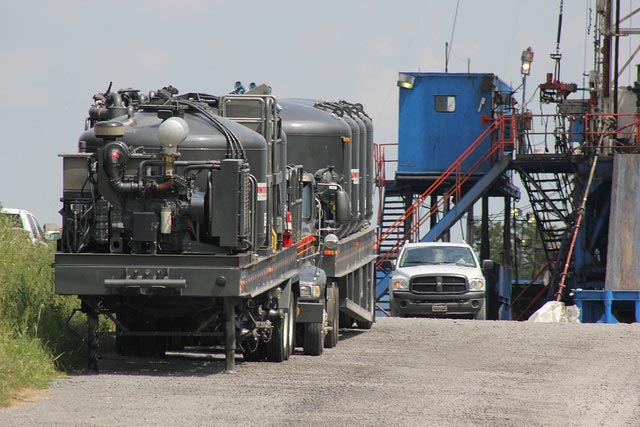
Expectant mothers who live near natural gas fracking wells are 40% more likely to give birth prematurely and a 30% increased incidence of ‘high-risk’ pregnancies.
The finding comes in a new study by Johns Hopkins Bloomberg School of Public Health published in the journal Epidemiology which examines the health of Pennsylvania residents both near to and far from gas fracking operations.
“The growth in the fracking industry has gotten way out ahead of our ability to assess what the environmental and, just as importantly, public health impacts are”, says study leader Brian S. Schwartz, MD, a professor in the Department of Environmental Health Sciences at the Bloomberg School.
“More than 8,000 unconventional gas wells have been drilled in Pennsylvania alone and we’re allowing this while knowing almost nothing about what it can do to health. Our research adds evidence to the very few studies that have been done in showing adverse health outcomes associated with the fracking industry.”
Pennsylvania’s fracking industry has been booming since 2006, when the state had fewer than 100 unconventional gas wells. Now in 2015 there are more than 8,000. At the industry’s peak in 2011, 1,900 new wells were drilled.
Health officials have been concerned about the effect of the drilling on air and water quality, as well as the stress of living near a well where just developing the site of the well can require 1,000 truck trips on once-quiet roads.
New York State has banned fracking altogether and there is a moratorium on it in Maryland, Pennsylvania has embraced the industry.
A 40 Percent Increase in Pre-Term Babies
For his study, Schwartz and his colleagues analyzed data from Geisinger Health System, which covers 40 counties in north and central Pennsylvania. They studied the records of 9,384 mothers who gave birth to 10,946 babies between January 2009 and January 2013.
They compared that data with information about wells drilled for fracking and looked at how close they were to the homes of the pregnant mothers as well as what stage of drilling the wells were in, how deep the wells were dug and how much gas was being produced at the wells during the mothers’ pregnancies. Using this information, they developed an index of how active each of the wells were and how close they were to the women.
The researchers found that living in the most active quartile of drilling and production activity was associated with a 40% increase in the likelihood of a woman giving birth before 37 weeks of gestation – considered pre-term.
There was also a 30% increase in the chance that an obstetrician had labeled their pregnancy ‘high-risk’, a designation that can include factors such as elevated blood pressure or excessive weight gain during pregnancy. When looking at all of the pregnancies in the study, 11% of babies were born preterm, with the majority – 79% – born between 32 and 36 weeks.
The US Centers for Disease Control and Prevention says that preterm-related causes of death together accounted for 35% of all infant deaths in 2010, more than any other single cause. Being born prematurely is also a leading cause of long-term neurological disabilities in children. Preterm birth cost the US health care system more than $26 billion in 2005, they say.
Policymakers – Proceed With Caution!
While the study can’t pinpoint why the pregnant women had worse outcomes near the most active wells, Schwartz says that every step of the drilling process has an environmental impact.
When the well pads are created, diesel equipment is used to clear acres of land, transport equipment and drill the wells themselves. Next, drilling down thousands of feet and then horizontally many more thousands of feet requires heavy equipment to break up the shale where the gas sits.
Hydraulic fracturing (fracking) then involves injecting millions of liters of water mixed with chemicals and sand to fracture the shale. The fluids are then pumped back to the surface. The gas itself also releases pollutants.
Schwartz adds that having a well developed nearby results in increased noise, road traffic and other changes that can increase maternal stress levels.
“Now that we know this is happening we’d like to figure out why”, he says. “Is it air quality? Is it the stress? They’re the two leading candidates in our minds at this point.”
The industry has now slowed down as gas prices have declined from $12.11 per thousand cubic feet in 2011 to $3.69 per thousand cubic feet in July. The state is on track for fewer than 500 new wells in 2015 compared to 2011’s 1,900, says Schwartz. But he predicts the economy will again shift and fracking will again be back in favor.
And he believes policymakers must understand the risks as they make decisions on future wells. While the research is still in its infancy, Schwartz says everything that has come out so far should give decision makers cause for concern:
“The first few studies have all shown health impacts. Policymakers need to consider findings like these in thinking about how they allow this industry to go forward.”
The paper: ‘Unconventional Natural Gas Development and Birth Outcomes in Pennsylvania, USA‘ by Joan A. Casey, David A. Savitz, Sara G. Rasmussen, Elizabeth L. Ogburn, Jonathan Pollak, Dione G. Mercer and Brian S. Schwartz is published in Epidemiology.
The study was funded by grants from the National Institutes of Health’s National Institute of Environmental Health Sciences (ES023675-01, ES071541), the Robert Wood Johnson Foundation Heath & Society Scholars Program and the National Science Foundation Integrative Graduate Education and Research Traineeship.